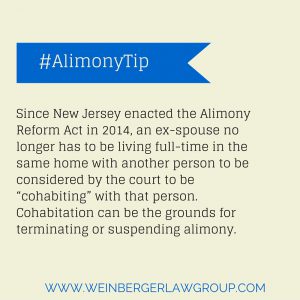Cohabitation and Alimony in New Jersey: The Quinn Case
 Since New Jersey enacted the Alimony Reform Act in 2014, an ex-spouse no longer has to be living full-time in the same home with another person to be considered by the court to be “cohabiting” with that person. Prior to the Act, many divorced people would act as though they were married to their new partner, but would stop short of actually moving in with that person full time, in an attempt to keep their alimony. Now, a divorced spouse does not need to be living with a new boyfriend or girlfriend on permanent, full-time basis to have their alimony stopped.
Since New Jersey enacted the Alimony Reform Act in 2014, an ex-spouse no longer has to be living full-time in the same home with another person to be considered by the court to be “cohabiting” with that person. Prior to the Act, many divorced people would act as though they were married to their new partner, but would stop short of actually moving in with that person full time, in an attempt to keep their alimony. Now, a divorced spouse does not need to be living with a new boyfriend or girlfriend on permanent, full-time basis to have their alimony stopped.
This is fairly new territory for the courts, and some cases have come before the court system since the Act was passed in 2014 regarding cohabitation and spousal support. For example, Quinn v. Quinn, decided just yesterday, addressed whether a court can suspend alimony for the period of time the person receiving the alimony cohabited with another person, rather than terminate the alimony completely as stated clearly in the parties’ property settlement agreement. The parties in that case had a very long trial regarding Ms. Quinn living with another man and after trial, the court determined that she cohabited with this man from January 2008 to April 2010. The court, rather than stopping the alimony completely, suspended the payments from 2008 to 2010. Mr. Quinn had to begin paying alimony again, after Ms. Quinn stopped living with her boyfriend. The appellate court agreed with the trial court.
However, the New Jersey Supreme Court disagreed.
In its ruling, the New Jersey Supreme Court stated that there was no basis to do anything other than to enforce the clear and unequivocal language of the parties’ property settlement agreement. Throughout the earlier trial, Ms. Quinn maintained that she did not cohabit with her boyfriend because she did not live with him full-time. The record showed that even though her boyfriend maintained his own house, he used her address, was at her home consistently when she was not and that they held out their relationship to friends and family as a partnership. The lower court found that she did indeed cohabit with her boyfriend. But, that court did not terminate the alimony as per the agreement. It was here that the Supreme Court disagreed.
There was no dispute at the trial court or at the appellate level that Ms. Quinn did indeed cohabit with her boyfriend. The trial court properly used the Konzelman case to analyze whether or not Ms. Quinn and her boyfriend were in fact cohabiting. Ms. Quinn fought this issue throughout and even asked the New Jersey Supreme Court to review whether or not she was actually cohabiting with her boyfriend. The Court declined to hear this issue and only examined the lower courts’ decisions to suspend rather than terminate Mr. Quinn’s alimony obligation. The Court stated, “Agreements to terminate alimony upon the cohabitation of the recipient spouse are enforceable so long as the relationship constitutes cohabitation…” and the cohabitation clause in the divorce agreement was voluntary and consensual. Here, the Quinn’s agreement was fair, voluntary and consensual. It was also clear: It stated that “alimony shall terminate upon the Wife’s death, the Husband’s death, the Wife’s remarriage or the Wife’s cohabitation, per case or statutory law, whichever shall first occur.”
Cohabitation & Alimony Reform
To be clear, when the Quinns entered into their agreement, the 2014 Act was not yet enacted. According to the relevant law at the time, found in the Konzelman case, cohabitation was considered a relationship that was shown to be “serious and lasting.” There really was no question that Ms. Quinn’s relationship fit this description. The Act now specifically states that “alimony may be suspended or terminated if the payee cohabits with another person.” So, under the act, Mr. Quinn’s alimony could have been merely suspended. But, because the Act didn’t exist at the time of their agreement, the agreement fully applied. No suspension, only termination of the alimony payments for Ms. Quinn’s cohabiting with her boyfriend.
Those who called for alimony reform do believe that the Alimony Reform Act did level the playing field more for those paying alimony, especially with the elimination of permanent alimony. But, as the Act is interpreted and applied to specific cases here in New Jersey, it is going to continue to be analyzed as to its meaning, scope and intent, something that Weinberger Divorce & Family Law Group, LLC founder, Bari Weinberger recently wrote about: Why Questions About Cohabitation and Alimony Still Linger After Alimony Reform.
Do you have questions about your alimony agreement? If you are paying or receiving alimony and have questions about your rights and obligations, please contact us today to set up your initial consultation with one of our experienced and dedicated family law attorneys.
Read More:


